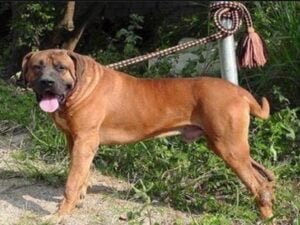
Detailed methods for raising Tosa dogs
Raising a Tosa dog requires a certain level of professional knowledge and patience. Here are some methods for raising Tosa dogs, you can refer to them.
Tosa Dog Feeding

Homemade household food: You can make light chicken or shrimp every now and then for Tosa dogs to eat. Chicken is easy to digest and has lower calorie content compared to beef and pork. But be careful not to add spices, and the amount of rice or noodles should be based on being able to be consumed in one go.
Purchasing Nutritional Canned Meat: Buying various types of canned meat in the store can enhance the appetite of Tosa dogs.
Purchase dry dog food: Dry dog food is easy to store and convenient, and can provide a lot of energy for Tosa dogs. Tosa dogs are large dogs, and feeding them large dog food can ensure their nutritional intake. During its growth and development period, it is necessary to supplement calcium and shark bone meal to ensure the healthy development of its bones.
Feeding precautions: Adult dogs are usually fed once in the morning and once in the evening, and some may only be fed once a day. However, if possible, it is best to divide the daily feeding amount into two parts, once in the morning and once in the evening, which is beneficial for reducing gastrointestinal burden and promoting full digestion and absorption of food.
Daily care of Tosa dogs
Teeth grinding: Tosa dogs need to constantly grind their teeth to prevent them from being too sharp and injuring others. They can be prepared with bite glue or grinding teeth.
Bathing: To keep the Tosa dog clean, it is necessary to bathe it in warm water and blow dry with a hair dryer. But the frequency of bathing should be moderate, as excessive frequency may affect the health of their skin and hair.
Health and Epidemic Prevention of Tosa Dog
Vaccination: Tosa dogs need to be regularly vaccinated, such as rabies vaccine and canine parvovirus disease vaccine, to prevent various diseases.
See a doctor: If you find any discomfort in your Tosa dog, you should promptly take it to a pet hospital for professional treatment.
Tosa Dog Training and Education
Patience training: Tosa dogs are not animals that can be immediately remembered and followed by just one or two teachings. They need to gradually form memories through continuous training. Therefore, it is required that breeders have patience and continuously train it.
Developing adaptability: Tosa dogs often avoid, bark at, or even destroy things they don’t like. In this situation, the first thing to do is to have patience and never be impatient. Let the Tosa dog slowly approach something it doesn’t like, while constantly speaking to it in a gentle voice to calm it down.
Correct in a timely manner: When Tosaki is about to do something that cannot be done, it should be stopped loudly and decisively. If you scold it afterwards, the Tosa dog will not understand the reason behind it and will still continue to do those “impossible” things.
Social and companionship of Tosa dogs
Tosa dogs have a high level of vigilance and are naturally protective, so they should not easily come into contact with strangers or other dogs. However, it also requires some social interaction and companionship, and can be taken for walks or interact with other pets, but to ensure environmental safety.
Overall, raising a Tosa dog requires investing enough time, energy, and patience, paying attention to its diet, health, training, and social aspects. At the same time, it is also important to understand the personality traits and behavioral habits of Tosa dogs in order to better interact with them.
American Dingo animal behavior Budget Tips canine behavior Canine Care Canine Health Dehydration dog age dog behavior Dog Breeds dog care Dog Care Tips dog exercise dog flea treatment Dog Food Dog Grooming dog health dog nutrition dog ownership Dog Sleep Tips Dog Training Dog Wound Care Family Pets First Aid Giardia Prevention Healthy Pets Hunting Dogs newborn puppy care Parasites in Dogs Pet Care Pet Care Tips Pet Health Pet Safety pet tips pet training Positive Reinforcement Potty Training prevent flea bites Puppy Care puppy health Puppy Training Rabies in Dogs Training Tips veterinary advice Veterinary Care
-
 How to Tell If Your Dog Has a Broken Bone
5 views
How to Tell If Your Dog Has a Broken Bone
5 views -
 Which is the best way to keep a small dog
4 views
Which is the best way to keep a small dog
4 views -
 Why Do Dogs Eat Rabbit Poop?
3 views
Why Do Dogs Eat Rabbit Poop?
3 views -
 How to Clean a Dog’s Wound: A Step-by-Step Guide
3 views
How to Clean a Dog’s Wound: A Step-by-Step Guide
3 views -
 How to Identify a Goldador
2 views
How to Identify a Goldador
2 views -
 How to Diagnose Canine Distemper: A Comprehensive Guide
2 views
How to Diagnose Canine Distemper: A Comprehensive Guide
2 views -
 10 Effective Tips on How to Massage a Dog to Poop
2 views
10 Effective Tips on How to Massage a Dog to Poop
2 views -
 How to Deal with Abscesses on Newly Born Puppies
2 views
How to Deal with Abscesses on Newly Born Puppies
2 views -
 5 Reasons Why Dachshunds Burrow Under Blankets
2 views
5 Reasons Why Dachshunds Burrow Under Blankets
2 views -
 How to Measure Your Dog’s Height Correctly
2 views
How to Measure Your Dog’s Height Correctly
2 views










Leave a Reply
You must be logged in to post a comment.